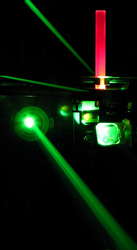Laser powering the future of viable power sources
The 'Interaction of ultra-intense laser pulses with plasmas' (ILP-ULTRA) project intends to characterise a broad array of laser plasma parameters analytically, in large-scale numerical computer simulations as well as experimentally. The project initially evaluated relatively intense ultra-short duration laser pulses interacting with solid targets, both with computer models and experimentally. The focus here was on defining optimum conditions for electron and ion acceleration. The researchers also studied laser pulses of longer duration and higher energy, related to target acceleration applied to inertial fusion. Characterisation of laser-matter interactions could have significant impact on nuclear fusion reactions, in particular as related to heating of fuel ignition targets in inertial confinement fusion (ICF). ICF has not yet been useful in producing more energy than it consumes. Results such as those being produced by the project may bring ICF one step closer to becoming a commercially viable power source in the future.







